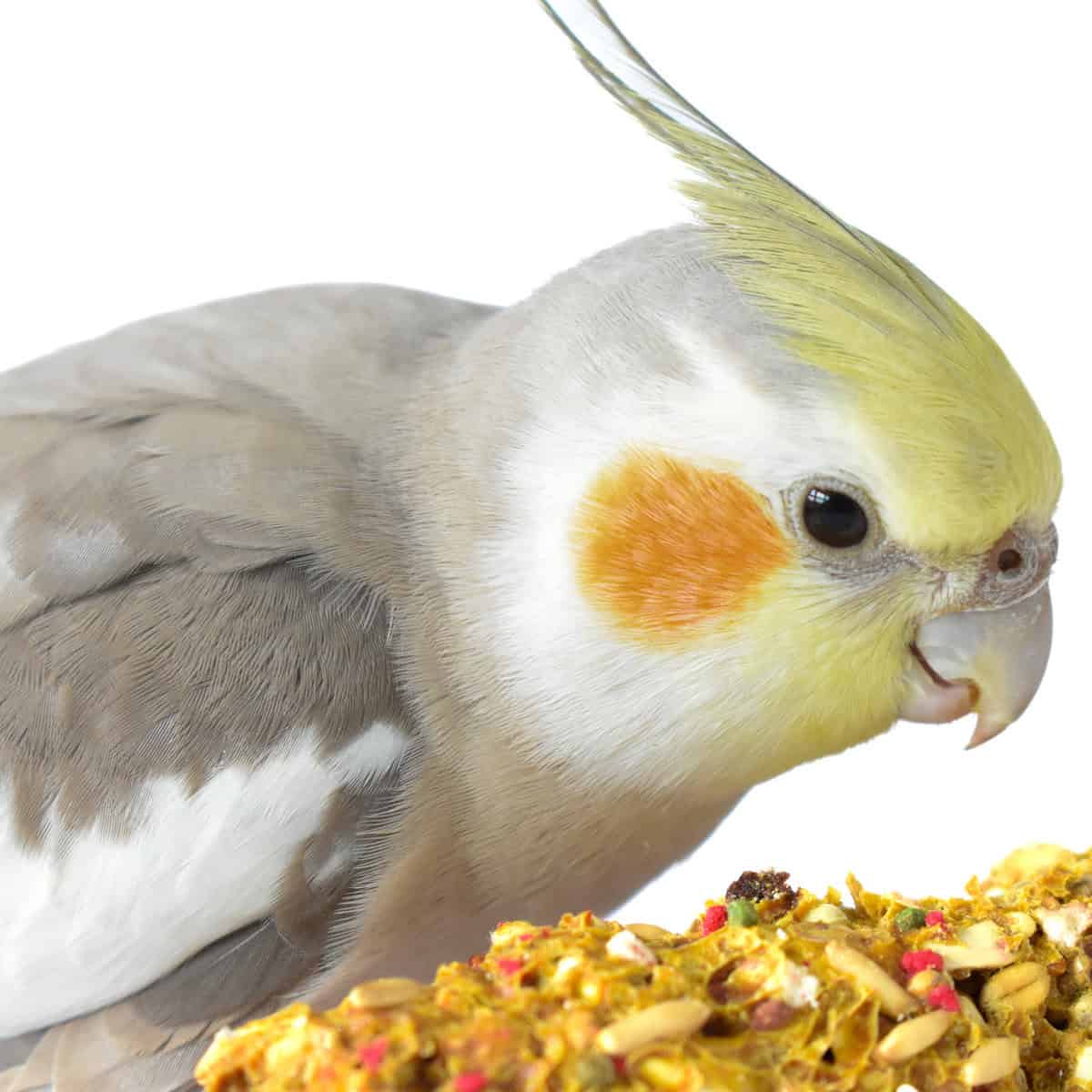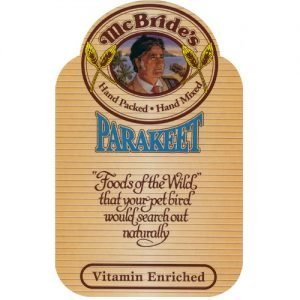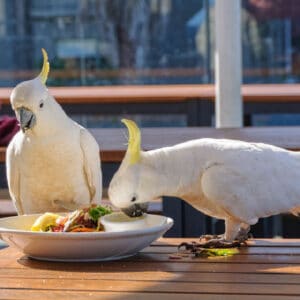Last Updated on by Catherine Tobsing
Pet birds are complex creatures with unique dietary needs, and providing them with the right foods is essential for their health, happiness, and longevity.
While many bird owners start with a seed mix, there are better, more balanced options that can improve a bird’s overall wellness.
In this guide, we’ll explore the essential nutrients birds need, the best food options in each category, and how to create a balanced diet to keep your feathered friend healthy.
Understanding Essential Nutrients for Pet Birds
Birds require a specific set of nutrients to thrive, including proteins, fats, carbohydrates, vitamins, and minerals. Each nutrient plays a role in different aspects of their well-being:
- Protein: Vital for feather development, muscle health, and overall growth.
- Fats: Needed for energy but should be balanced to prevent obesity, especially in smaller birds.
- Vitamins & Minerals: Vitamin A, D, calcium, and magnesium are crucial for bone health, immune function, and vision.
Meeting these needs through a variety of foods, such as pellets, fruits, vegetables, and occasional grains or seeds, will help create a well-rounded diet for your bird.
Pellet-Based Diets: The Foundation of Balanced Nutrition
Pellets are often considered the backbone of a bird’s diet because they’re designed to provide balanced nutrition in every bite.
- Unlike seed-only diets, which can lead to picky eating, pellets ensure your bird is getting consistent nutrients.
- Benefits of Pellets: Pellets offer a mix of essential vitamins, minerals, and proteins, which help in reducing nutritional deficiencies.
- Choosing the Right Pellet: Look for pellets free from artificial colors and sugars. Brands that specialize in avian nutrition, like Harrison’s and Roudybush, are typically reliable.
To introduce pellets, mix them with the bird’s current food and gradually increase the ratio over several weeks.
Birds can be resistant to change, so patience is key here.
Fresh Fruits and Vegetables: Adding Variety and Vital Nutrients
While pellets are a great foundation, fresh produce provides essential vitamins, natural fiber, and hydration that pellets alone can’t offer.
Fruits
- Best Choices: Apples (no seeds), berries, bananas, mango, and melon are safe and nutritious.
- Nutritional Benefits: Fruits like blueberries and strawberries are rich in antioxidants, while others, like oranges, offer vitamin C.
Vegetables
- Best Choices: Leafy greens (kale, spinach), carrots, bell peppers, broccoli, and zucchini.
- Nutritional Benefits: Dark greens provide vitamin A, which is essential for immune health and eye function. Carrots and sweet potatoes, meanwhile, are rich in beta-carotene.
- Preparation Tips: Always wash produce thoroughly to remove pesticides. Chop fruits and vegetables into bite-sized pieces to make them easier for birds to handle, and remove any seeds or pits, which can be toxic.
Toxic Foods to Avoid
Some foods are toxic to birds, even in small amounts. These include avocado, chocolate, caffeine, onions, garlic, and alcohol. Always double-check before introducing new foods to ensure they’re safe.
Grains and Legumes: Additional Sources of Protein and Fiber
Grains and legumes are an excellent addition to a bird’s diet, providing a source of protein, fiber, and various vitamins and minerals.
- Bird-Safe Grains**: Quinoa, brown rice, oats, and barley are nutritious options.
- Legumes: Beans, lentils, and peas offer plant-based protein but should be fully cooked and given in moderation.
- Preparation: Always cook grains and legumes without salt or spices, as these additives can harm birds.
Seeds: A Tasty Treat, Not the Main Course
Seeds are high in fat and can lead to obesity if they form a large part of a bird’s diet. However, they can still be enjoyed in moderation as treats or rewards.
- Seed Types: Sunflower seeds, pumpkin seeds, and safflower seeds can be offered occasionally.
- When to Give Seeds: Use seeds as training rewards or to add variety to your bird’s diet.
Offering seeds sparingly helps birds stay fit and prevents them from developing selective eating habits, where they choose seeds over other foods.
Healthy Treats for Training and Bonding
Treats play a valuable role in bonding with your bird, especially when used for positive reinforcement during training sessions. However, moderation is essential to prevent weight gain and ensure treats don’t replace meals.
- Safe Treats: Unsalted nuts (almonds, walnuts), unsweetened dried fruits, and even small amounts of plain, unsweetened popcorn can be fun for birds.
- DIY Treats: Try baking a mix of rolled oats, chopped nuts, and a little natural honey into small bird-safe treats for a special snack.
Keep treats to about 5-10% of your bird’s daily intake to maintain a balanced diet.
Putting It All Together: Crafting a Balanced Feeding Routine
Building a diet plan that incorporates all these elements ensures your bird gets a well-rounded intake of nutrients.
Daily Feeding Guide:
- Mornings: Offer fresh fruits and vegetables to provide energy and hydration.
- Afternoons: Place pellets as the main food source.
- Evenings: A small serving of grains or legumes to round out the day’s protein intake.
Sample Day’s Menu:
- Breakfast: Diced apple, carrot, and spinach leaves.
- Lunch: Pellet mix.
- Dinner: A tablespoon of cooked quinoa or a small piece of sweet potato, with a few pumpkin seeds as a treat.
Using a variety of foods not only keeps your bird engaged and interested but also promotes their health and longevity.
Birds are intelligent and enjoy exploring different textures and flavors, so mixing up their meals will also provide mental stimulation.
Conclusion
Providing a balanced diet for your pet bird is one of the most important things you can do as an owner.
By combining pellets, fresh produce, grains, and occasional seeds and treats, you’ll be able to offer a varied and nutritious diet that supports your bird’s overall health and happiness.
Remember, each bird is unique, so pay attention to their preferences and adjust as needed.
With a little planning, you can create a feeding routine that keeps your feathered friend thriving.
Written by Mitch Rezman and the Windy City Parrot Content Team
Author Profile
Latest entries
 Feeding Exotic BirdsDecember 29, 2025How to Switch or Convert Your Bird From Seeds to Pellets: Real-Life Case Studies and Practical Guidance
Feeding Exotic BirdsDecember 29, 2025How to Switch or Convert Your Bird From Seeds to Pellets: Real-Life Case Studies and Practical Guidance Feeding Exotic BirdsDecember 16, 2025A Practical, Budget-Smart Guide to Feeding Birds Well
Feeding Exotic BirdsDecember 16, 2025A Practical, Budget-Smart Guide to Feeding Birds Well Bird EnviornmentsDecember 7, 2025Understanding Budgie Cage Bar Orientation: Myths, Realities & Practical Solutions for Vertical-Bar Bird Cages
Bird EnviornmentsDecember 7, 2025Understanding Budgie Cage Bar Orientation: Myths, Realities & Practical Solutions for Vertical-Bar Bird Cages Feeding Exotic BirdsDecember 5, 2025How Dr. T.J. Lafeber Rewrote the Future of Pet Bird Nutrition
Feeding Exotic BirdsDecember 5, 2025How Dr. T.J. Lafeber Rewrote the Future of Pet Bird Nutrition



